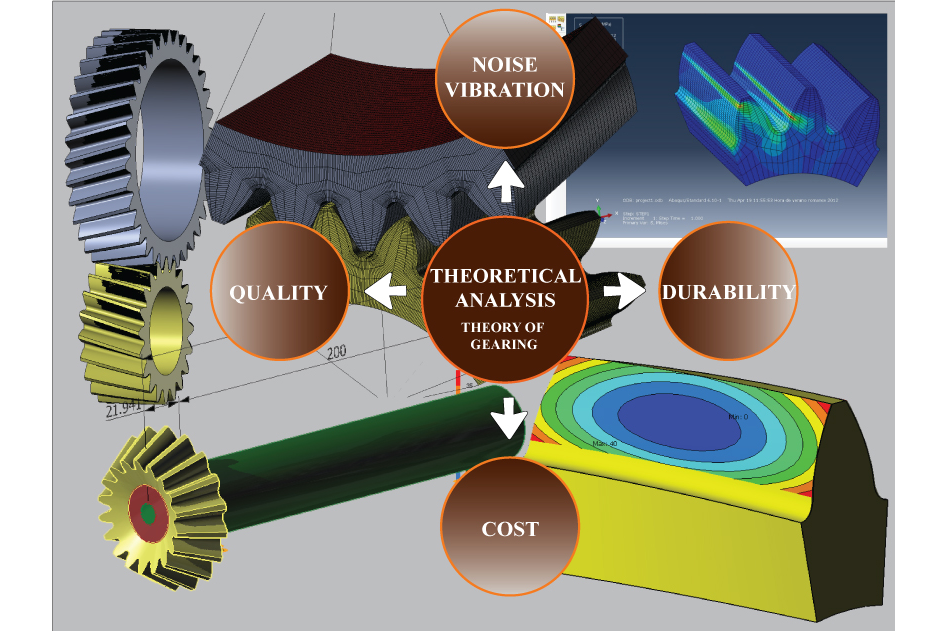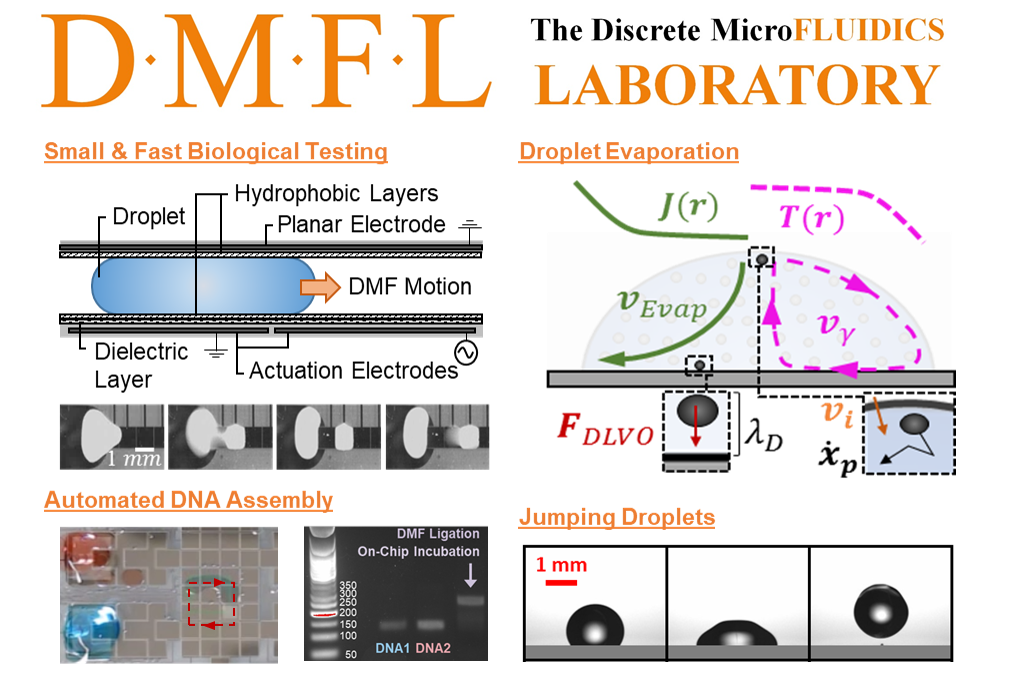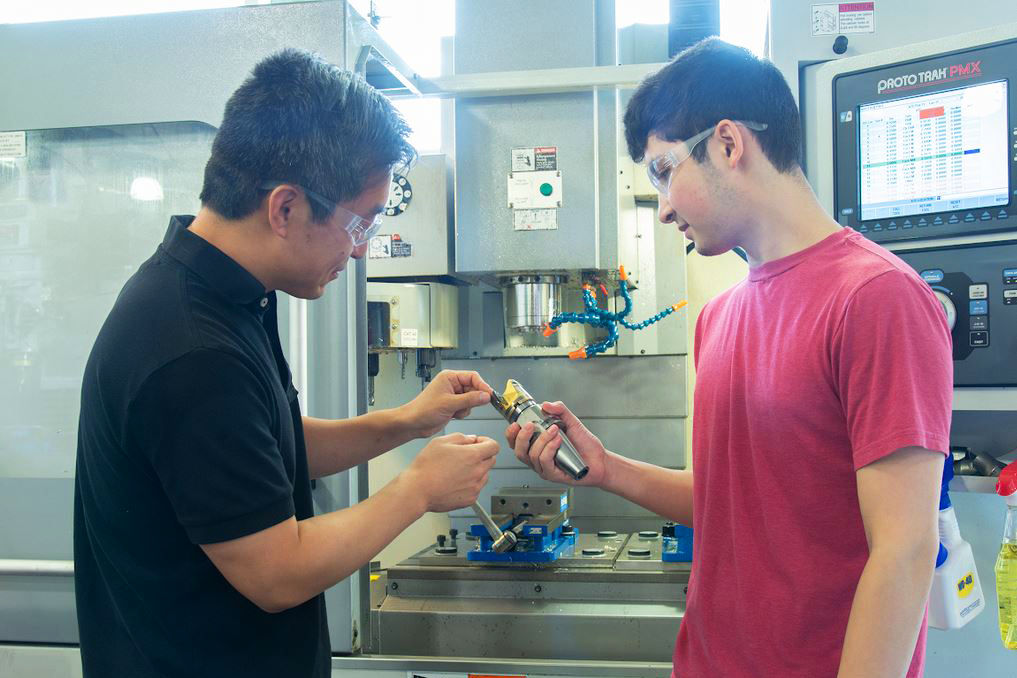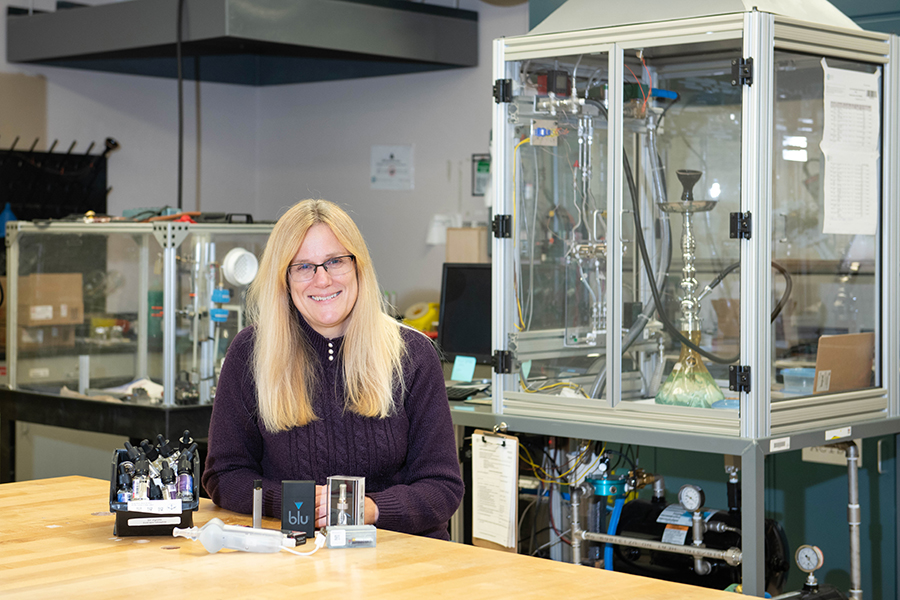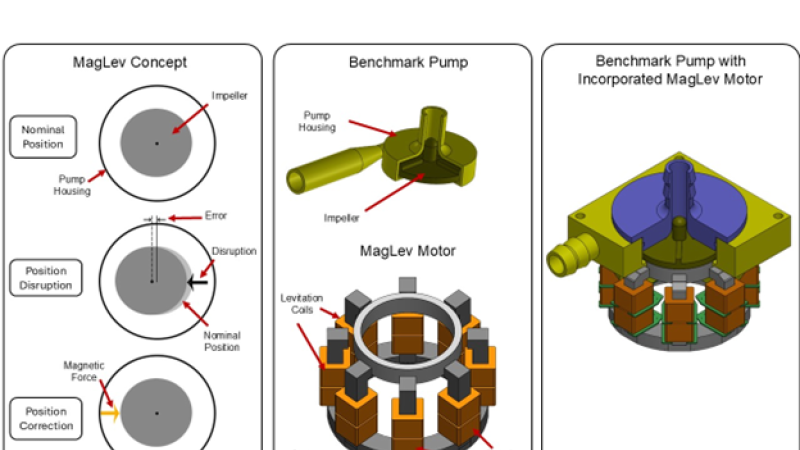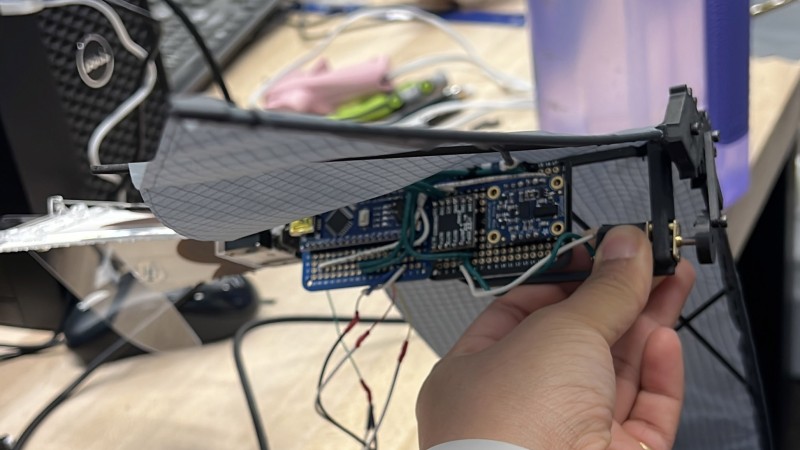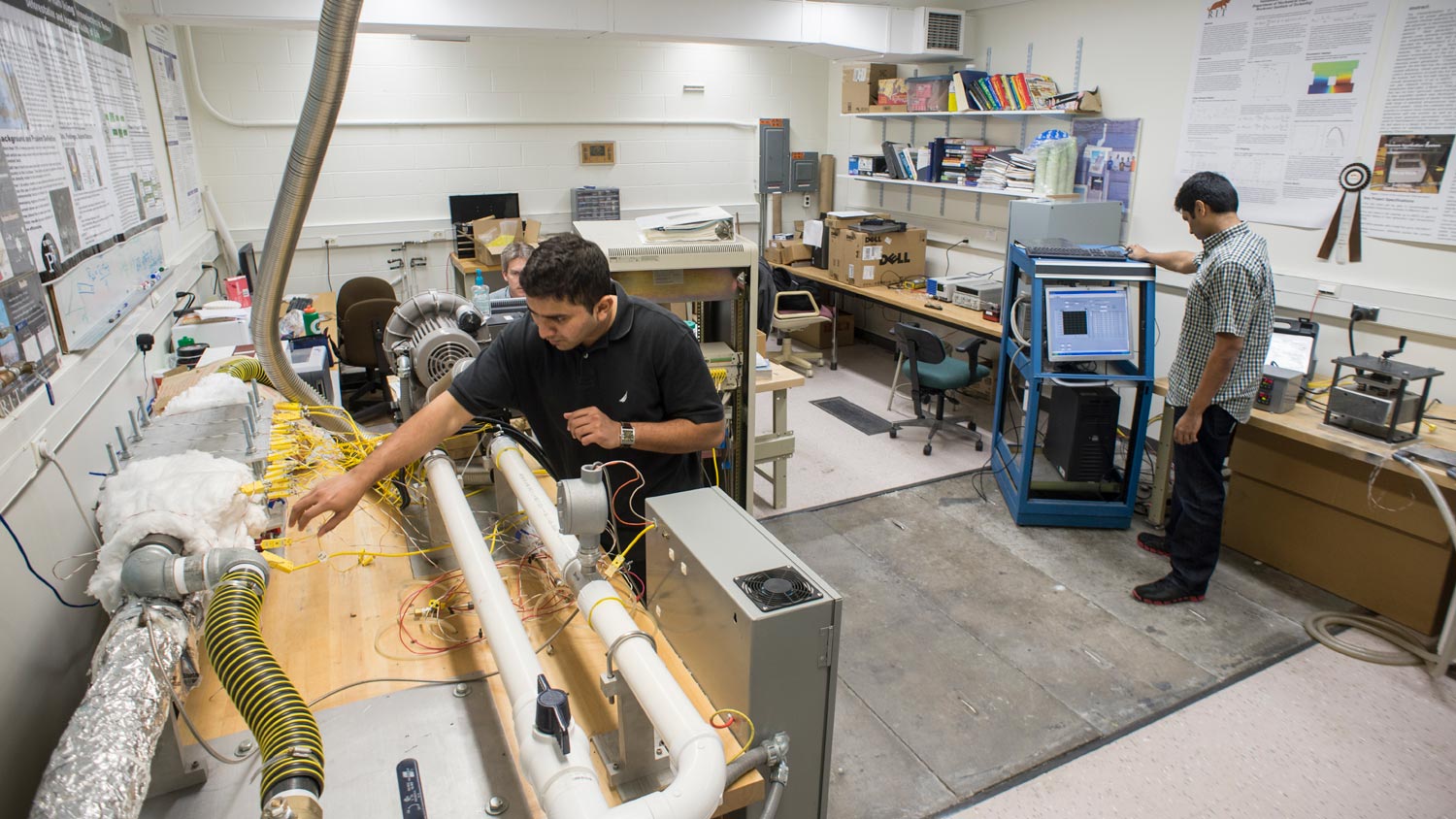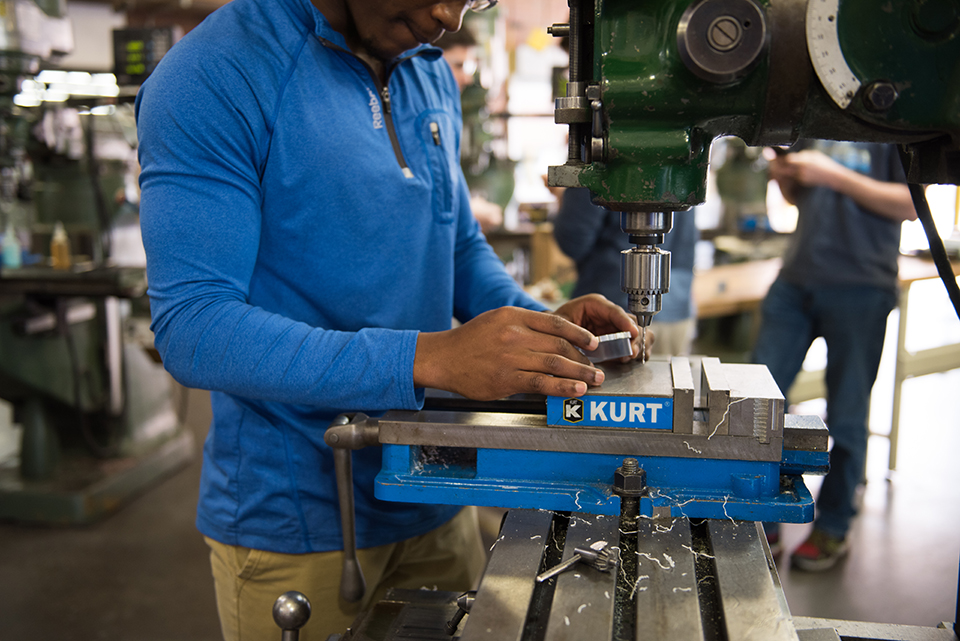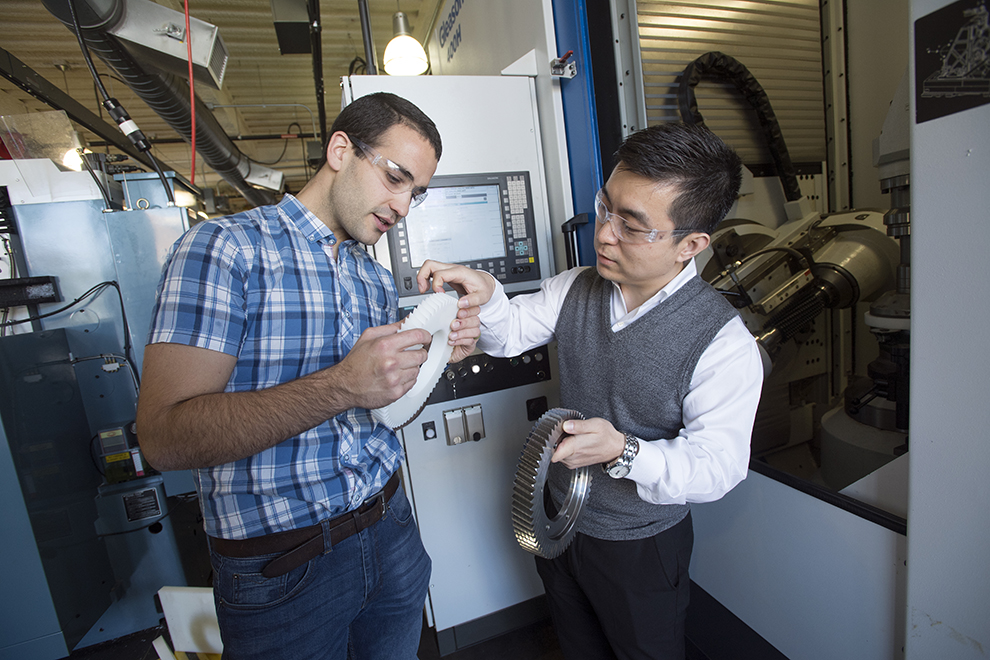Department of Mechanical Engineering
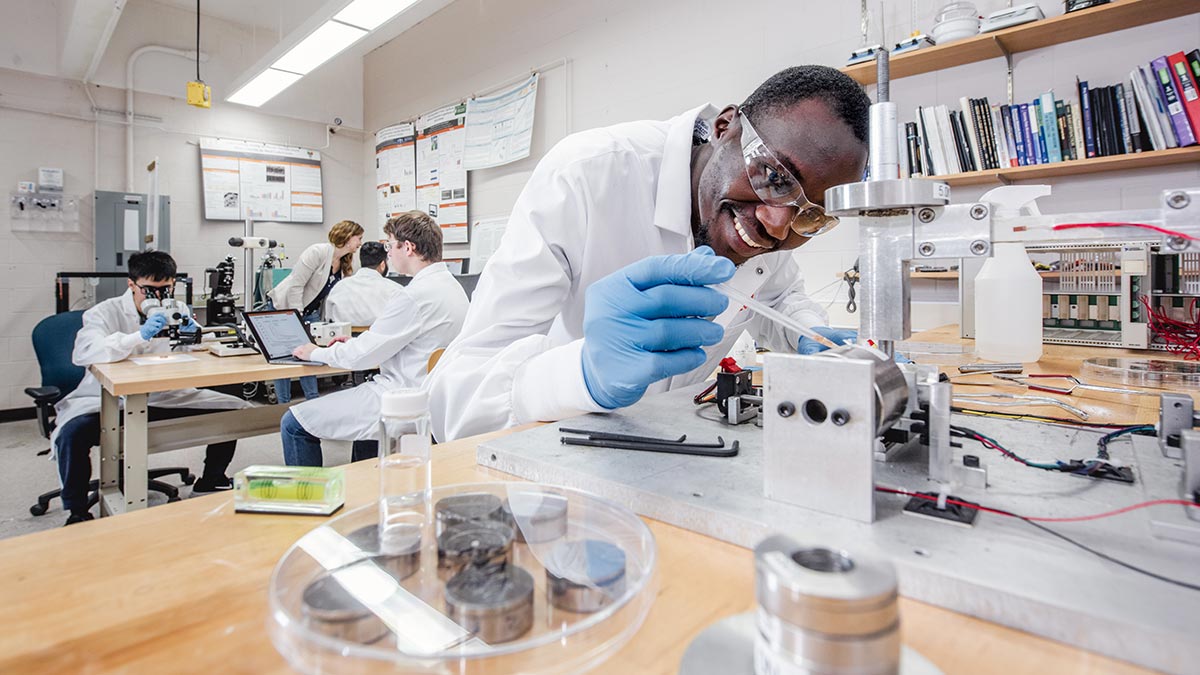
Department of
Mechanical Engineering
- RIT/
- College of Engineering/
- Academics/
- Departments/
- Mechanical Engineering
Contact
Bob Carter, Associate Department Head
585-475-7098, rncbme@rit.edu
The Department Mechanical Engineering Office
585-475-5181, mece@rit.edu
Overview
From rockets to robots, power plants to biomechanical parts, mechanical engineers put both energy and machines to work. Wherever there is motion or energy, mechanical engineers have played a role in the innovations that define modern life.
Mechanical engineering is a broad discipline, covering topics that include aerodynamics, medical devices, energy systems, system control, robotics, new product development, materials development, structural integrity, manufacturing, automotive systems, and space vehicle systems. The mechanical engineering department offers a solid foundation in mechanical engineering fundamentals with options for students to concentrate their studies in several specific areas of engineering.
Mechanical engineers work in many different industries and businesses as product developers, researchers, prototype designers, automotive engineers, aerospace engineers, management consultants, among many others. Because of their comprehensive training, mechanical engineers are often called upon to serve in senior leadership positions.
Well-equipped labs and facilities offer students the opportunity to build models and prototypes to demonstrate particular engineering design concepts. Experimentation and research are encouraged and there are opportunities for students to enrich their undergraduate and graduate experience by engaging in faculty-led research in areas such as sustainable energy systems, biomedical and assistive device technology, systems analysis, robotics, vibrations, and automotive and aerospace engineering.
Accreditation
The BS degree in mechanical engineering is accredited by the Engineering Accreditation Commission of ABET, www.abet.org. For Enrollment and Graduation Data, Program Educational Objectives, and Student Outcomes, please visit the college’s Accreditation page.
4
Undergraduate options in aerospace, automotive, bioengineering, and energy and the environment
5
Areas of research
1000+
Undergraduate and graduate mechanical engineering students
Degree Programs
Undergraduate Degrees
The aerospace engineering option allows for specialized study in all engineering aspects of air- and space-borne vehicles.
Learn more about the Aerospace Engineering Option - Mechanical Engineering BS programStudy vehicle systems, powertrains, dynamics, and design in RIT’s automotive engineering option.
Learn more about the Automotive Engineering Option - Mechanical Engineering BS programBioengineering is the application of engineering fundamentals to the principles of biology, the life sciences, and the physical sciences.
Learn more about the Bioengineering Option - Mechanical Engineering BS programThe energy and environment option is focused on identifying, developing, and effectively utilizing alternative energy systems.
Learn more about the Energy and the Environment Option - Mechanical Engineering BS programWhether you are interested in rockets, robots, healthcare, or energy, RIT’s mechanical engineering BS combines cutting-edge technology with hands-on experience to launch your career.
Learn more about the Mechanical Engineering BS programGraduate Degrees
With RIT’s mechanical and industrial engineering Ph.D., you’ll gain knowledge in mechanical and industrial engineering while engaging in cutting-edge research.
Learn more about the Mechanical and Industrial Engineering Ph.D. programThe mechanical engineering ME equips graduates to design engineered systems using core mechanical engineering principles and tools.
Learn more about the Mechanical Engineering ME programRIT’s mechanical engineering MS gives you the skills to examine dynamics, robotics, nanotechnology, biomechanics, and energy systems.
Learn more about the Mechanical Engineering MS programIn RIT's microsystems engineering Ph.D., you’ll conduct research in nano-engineering, design methods, and technologies for micro- and nano-scaled systems.
Learn more about the Microsystems Engineering Ph.D. programVibration engineering helps you control vibration in engineering systems and in everything from consumer product development and design, manufacturing, aerospace and automotive systems, and more.
Learn more about the Vibrations Adv. Cert. programMinors and Immersions
The minor in mechanical engineering exposes students to the core foundations of the discipline. Courses help non-majors explore high-technology careers and communicate more effectively with engineers on project teams. The minor consists of a five-course sequence that builds on prerequisite knowledge from calculus and engineering mechanics. Elective courses provide additional depth of knowledge in an area of individual student interest.
Learn more about the Mechanical Engineering Minor programResearch
Advanced Gear Design and Simulation
Led by Dr. Alfonso Fuentes-Aznar, the research performed at RIT’s Gear Research Laboratory is focused on the study of new gear geometries and the development of new methodologies for advanced design, analysis, simulation, and troubleshooting of gear drives.
Led by Dr. Howard Tu, the Clean Energy and Water lab targets interdisciplinary problems coupling mechanics, electrochemistry, and materials in the field of energy storage and water desalination.
The Discrete Microfluidics Laboratory studies the physics of small droplets. The goal is to understand fluid interactions and leverage the physics of microdroplets for innovative advancements in current technologies.
The Smart Manufacturing Research Group (SMRG), under the leadership of Dr. Rui Liu, is dedicated to investigating the research problems related to smart manufacturing on the fundamental level and expanding the research scope by exploring new research topics and introducing state-of-the art technologies.
The Respiratory Technologies Lab (RTL) specializes in the mechanics of inhaled particles. Its current research focus is to understand the relationship between tobacco product characteristics, behavior, and health effect. The RTL studies e-cigarettes, waterpipe, cigarettes, and tobacco heated products.
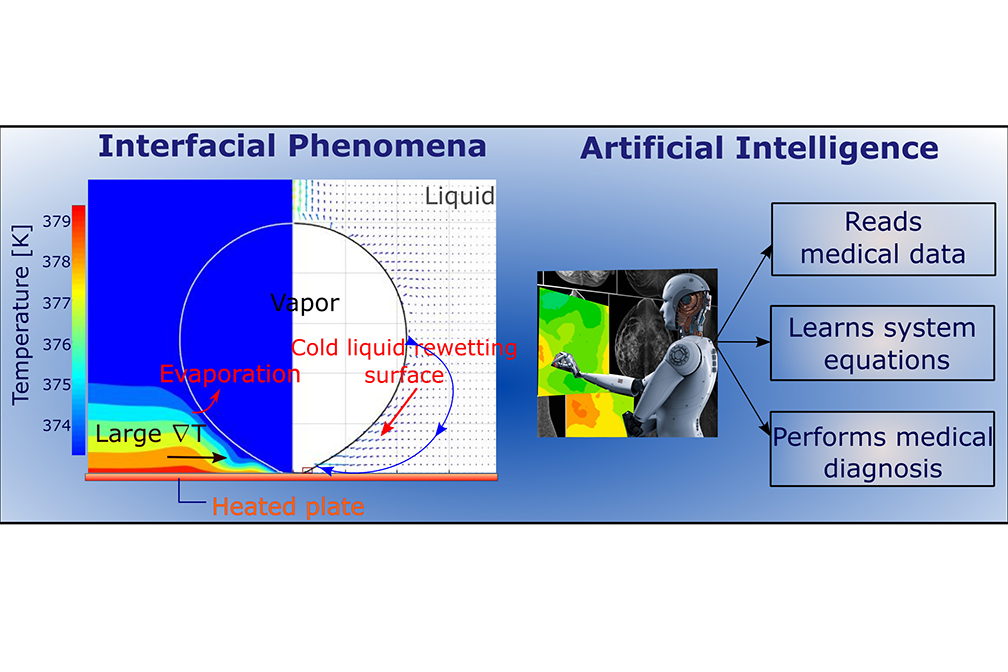
Interfaces and AI-Powered Diagnosis
Dr. Isaac Perez-Raya conducts research on interfacial phenomena such as boiling heat transfer and applies artificial intelligence (AI) in modeling of intracranial blood flow and breast cancer. Other relevant fields of study include pollution monitoring and optimization problems.
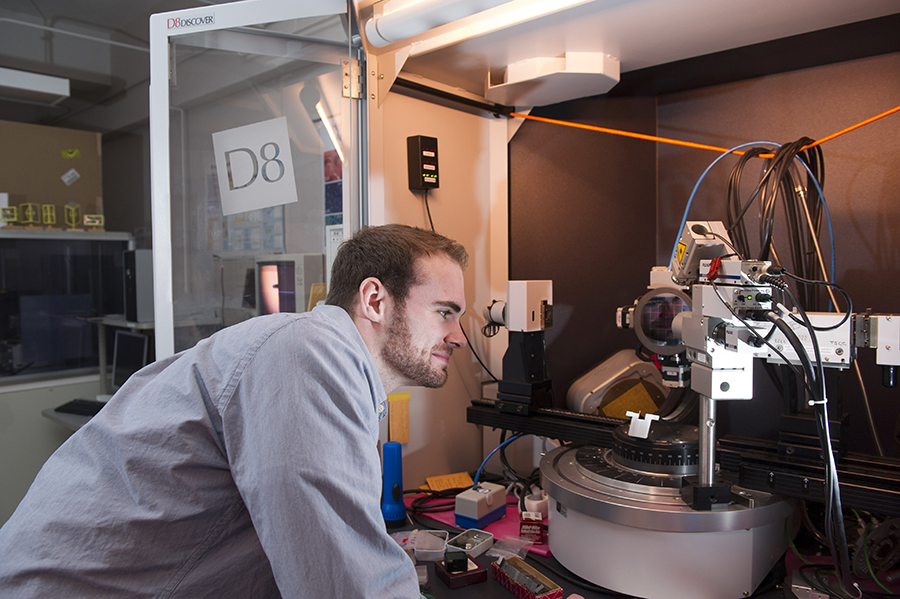
X-Ray Diffraction, Atomic Force Microscopy, Quantitative Microscopy
The Advanced Materials Laboratory focuses on X-ray diffraction (both powder and high resolution), scanning probe microscopies, optical microscopy, microhardness testing, and specimen preparation by mechanical and electrochemical polishing.
Latest News
-
November 19, 2025

Club sports help students find their fit
Club sports are a big part of student life at the university. Every year, about 2,000 students are involved with the nearly 50 different club sports. For many, it scratches that competitive itch. For others, it’s a chance to try something new, find a community, and stay active.
-
November 17, 2025

Tiger Love: Engineering alumni are sailing into retirement
Michael and Suzanne Pail met as engineering undergraduates during a first-year chemistry class. Since then, the two have kept a personal chemistry as engineers, business owners, and now shipmates sailing the ocean on Mira, their double-hull catamaran.
-
October 21, 2025

RIT faculty and students win Best Original Design at international charity competition
A multidisciplinary team of students and faculty continued an RIT tradition of participating in Canstruction Rochester by making EVE from WALL-E out of more than 2,400 canned goods.
Featured Work and Profiles
-
Analysis of Fluid Forces within a Magnetically Levitated Benchmark Blood Pump
Jonathan Lawley Magnetic levitation (MagLev) is the concept of using magnetic forces to support an object without physical contact. The concept has been successfully applied in systems such as high-speed trains, wind...
Read More about Analysis of Fluid Forces within a Magnetically Levitated Benchmark Blood Pump -
Model Free Sliding Mode Control for Unmanned Aerial Vehicles (UAVs)
Aashrita Mandalapu The development process of aerial robotics spans conceptual design and modeling using CAD tools, rapid prototyping through additive manufacturing (3D printing) in the early stages, and the selection...
Read More about Model Free Sliding Mode Control for Unmanned Aerial Vehicles (UAVs) -
Alumnus Combines Engineering and Design to Launch Startups
Ryan Larcom ’07 (mechanical engineering), ’07 ME (mechanical engineering, industrial design) is innovation executive at High Alpha Innovation, where he helps businesses bring to market life...
Read More about Alumnus Combines Engineering and Design to Launch Startups -
3D Printing Metal Implants Drop by Drop
Valeria Marin-Montealegre Recent advances in additive manufacturing of biometals—such as iron, magnesium, zinc, and their alloys—have opened new possibilities for patient-specific implants and bone plate systems.
Read More about 3D Printing Metal Implants Drop by Drop -
The Future of Lightweight Structures: Molten Metal 3D Printing Unlocks New Possibilities for Lattice Design
Paarth Mehta Lattice structures address a niche in the manufacturing industry due to their lightweight nature, energy absorption capabilities, high strength-to-weight ratio, and improved thermal management. These...
Read More about The Future of Lightweight Structures: Molten Metal 3D Printing Unlocks New Possibilities for Lattice Design -
Interplay of Interfacial Adhesion and Mechanical Degradation in Anode-free Solid-state Batteries
Imtiaz Ahmed Shozib Batteries play a critical role in powering modern life—from smartphones and laptops to electric vehicles and renewable energy systems. However, traditional lithium-ion batteries are approaching their...
Read More about Interplay of Interfacial Adhesion and Mechanical Degradation in Anode-free Solid-state Batteries
Student Clubs and Organizations
Pi Tau Sigma
Pi Tau Sigma is the mechanical engineering national honor society. Membership, by invitation, is open to students ranked in the upper third of their class in their fourth and fifth years at RIT. Chapter activities are tailored to foster high ideals in the engineering profession, support departmental activities, and promote professionalism.
Tau Beta Pi
This national engineering honor society was founded to celebrate those who have conferred honor upon their alma mater by distinguished scholarship and exemplary character as students in engineering, or by their attainments as alumni in the field of engineering, and to foster a spirit of liberal culture in engineering colleges. Election to Tau Beta Pi is one of the highest honors bestowed on an engineering student by his or her peers.
American Society of Mechanical Engineers
The student chapter of ASME offers educational, technical, and social activities. It helps students develop leadership skills and leads to contacts with engineers in industry and students at other colleges within the region. The student chapter is active and works closely with the local professional chapter.
Society of Automotive Engineers and FSAE Competition Team
The purpose of the RIT Society of Automotive Engineers is to give students the opportunity to meet with senior engineers in industry and provide students a chance to apply their classroom knowledge in various projects.
National Society of Black Engineers
The student chapter of the National Society of Black Engineers is dedicated to the retention, recruitment, and successful graduation of its members.
Society of Hispanic Professional Engineers
The Society of Hispanic Professional Engineers is an association of professionals and students in engineering, science, technology, business, and other related disciplines at RIT. SHPE’s aim is to identify and promote professional growth opportunities for Hispanic students.
Society of Women Engineers
The Society of Women Engineers is a student-run organization that organizes and hosts guest speakers, high school outreach, community activities, tours, social events, and events with other student organizations. The RIT chapter is strongly committed to encouraging women in their pursuit of careers in engineering or related fields.
Professional organizations and societies provide opportunities for students to enhance their professional development, including society-sponsored conferences, symposia, and workshops, through local and student chapter meetings and activities. Explore professional organizations and societies for opportunities to volunteer, get involved, and shape your career.
American Institute of Aeronautics and Astronautics
American Society for Engineering Education
American Society of Mechanical Engineers
Institution of Mechanical Engineers
Materials Research Society
National Society of Black Engineers
Rochester Engineering Society
SAE International
Society of Hispanic Professional Engineers
Society of Women Engineers
Aero Design Club
The student chapter is dedicated to promoting careers and opportunities in the aerospace industry.
Formula One SAE Racing Team
Our award-winning SAE team, builds a car from the ground up every year. Purchasing only the engine block, tires, and bulk materials, it is entirely designed and constructed by our students to compete in national and international competitions.
Student Resources
The Mechanical Engineering Department offers a variety of resources for our students that vary from academic support to handbooks and more. Visit our Student Resources page for more information.



